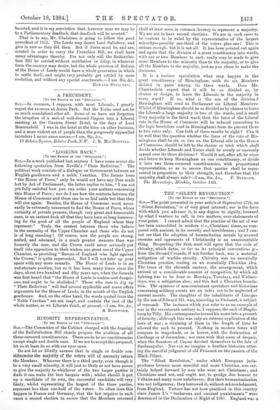"LOOKING BACK."
[To THE EDITOR OF THE " SPECTATOR."1 Sia,—In a work published last century I have come across the following quotation from Neville's "Plato Redivirus." The political work consists of a dialogue on GoVernment between an English gentleman and a noble Venetian. The former loves ." the House of Peers," only he would not have any Peer made but by Act of Parliament ; the latter replies to him, "I am not yet fully satisfied how you can order your matters concerning this House of Peers ; nor do I see how the contests between the Rouse of Commons and them can be so laid aside but that they will rise again. Besides, the House of Commons must neces- sarily be extremely concerned to find the House of Peers, whose curiosity of private persons, though very great and honourable ones, in an instant dash all that they have been so long hammer- ing for the good of all the people of England whom they represent." Truly the contest between those who believe in the necessity of the -Upper Chamber and those who do not is of long standing ! Of course, now the people are strong, united, and educated, in a much greater measure than was formerly the case, and the Crown could never seriously put itself into opposition to their wishes, one great use of the Upper Chamber, as providing "Barons of England who fight against the Crown," is quite superseded. But I will not take up your space with any more remarks. The House of Lords is in an unfortunate position, but so it has been many times since the -days, about two hundred and fifty years ago, when the formula was first heard that "the House of Lords is useless and danger- ons, and ought to be abolished." Those who care to dig up "Plato Redivivus " will find several applicable and many effete arguments for the House of Lords, in the month of the English gentleman. And, on the other hand, the words quoted from the -" Noble Venetian" are not inapt, and contain the root of the whole matter, as we Liberals think, at present.—I am, Sir, &c.,
A BOOKWORM.


































 Previous page
Previous page